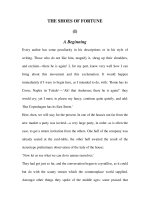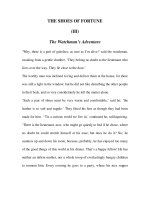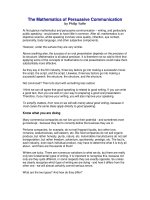Tài liệu THE SHOES OF FORTUNE (IV) pptx
Bạn đang xem bản rút gọn của tài liệu. Xem và tải ngay bản đầy đủ của tài liệu tại đây (38.43 KB, 14 trang )
THE SHOES OF FORTUNE
(V)
Metamorphosis of the Copying-Clerk
The watchman, whom we have certainly not forgotten, thought meanwhile
of the galoshes he had found and taken with him to the hospital; he now
went to fetch them; and as neither the lieutenant, nor anybody else in the
street, claimed them as his property, they were delivered over to the police-
office.*
* As on the continent, in all law and police practices nothing is verbal, but
any circumstance, however trifling, is reduced to writing, the labor, as well
as the number of papers that thus accumulate, is enormous. In a police-
office, consequently, we find copying-clerks among many other scribes of
various denominations, of which, it seems, our hero was one.
‘Why, I declare the Shoes look just like my own,’ said one of the clerks,
eying the newly-found treasure, whose hidden powers, even he, sharp as he
was, was not able to discover. ‘One must have more than the eye of a
shoemaker to know one pair from the other,’ said he, soliloquizing; and
putting, at the same time, the galoshes in search of an owner, beside his own
in the corner.
‘Here, sir!’ said one of the men, who panting brought him a tremendous pile
of papers.
The copying-clerk turned round and spoke awhile with the man about the
reports and legal documents in question; but when he had finished, and his
eye fell again on the Shoes, he was unable to say whether those to the left or
those to the right belonged to him. ‘At all events it must be those which are
wet,’ thought he; but this time, in spite of his cleverness, he guessed quite
wrong, for it was just those of Fortune which played as it were into his
hands, or rather on his feet. And why, I should like to know, are the police
never to be wrong? So he put them on quickly, stuck his papers in his
pocket, and took besides a few under his arm, intending to look them
through at home to make the necessary notes. It was noon; and the weather,
that had threatened rain, began to clear up, while gaily dressed holiday folks
filled the streets. ‘A little trip to Fredericksburg would do me no great harm,’
thought he; ‘for I, poor beast of burden that I am, have so much to annoy me,
that I don’t know what a good appetite is. ‘Tis a bitter crust, alas! at which I
am condemned to gnaw!’
Nobody could be more steady or quiet than this young man; we therefore
wish him joy of the excursion with all our heart; and it will certainly be
beneficial for a person who leads so sedentary a life. In the park he met a
friend, one of our young poets, who told him that the following day he
should set out on his long-intended tour.
‘So you are going away again!’ said the clerk. ‘You are a very free and
happy being; we others are chained by the leg and held fast to our desk.’
‘Yes; but it is a chain, friend, which ensures you the blessed bread of
existence,’ answered the poet. ‘You need feel no care for the coming
morrow: when you are old, you receive a pension.’
‘True,’ said the clerk, shrugging his shoulders; ‘and yet you are the better
off. To sit at one’s ease and poetise—that is a pleasure; everybody has
something agreeable to say to you, and you are always your own master. No,
friend, you should but try what it is to sit from one year’s end to the other
occupied with and judging the most trivial matters.’
The poet shook his head, the copying-clerk did the same. Each one kept to
his own opinion, and so they separated.
‘It’s a strange race, those poets!’ said the clerk, who was very fond of
soliloquizing. ‘I should like some day, just for a trial, to take such nature
upon me, and be a poet myself; I am very sure I should make no such
miserable verses as the others. Today, methinks, is a most delicious day for a
poet. Nature seems anew to celebrate her awakening into life. The air is so
unusually clear, the clouds sail on so buoyantly, and from the green herbage
a fragrance is exhaled that fills me with delight, For many a year have I not
felt as at this moment.’
We see already, by the foregoing effusion, that he is become a poet; to give
further proof of it, however, would in most cases be insipid, for it is a most
foolish notion to fancy a poet different from other men. Among the latter
there may be far more poetical natures than many an acknowledged poet,
when examined more closely, could boast of; the difference only is, that the
poet possesses a better mental memory, on which account he is able to retain
the feeling and the thought till they can be embodied by means of words; a
faculty which the others do not possess. But the transition from a
commonplace nature to one that is richly endowed, demands always a more
or less breakneck leap over a certain abyss which yawns threateningly
below; and thus must the sudden change with the clerk strike the reader.
‘The sweet air!’ continued he of the police-office, in his dreamy imaginings;
‘how it reminds me of the violets in the garden of my aunt Magdalena! Yes,
then I was a little wild boy, who did not go to school very regularly. O
heavens! ‘tis a long time since I have thought on those times. The good old
soul! She lived behind the Exchange. She always had a few twigs or green
shoots in water—let the winter rage without as it might. The violets exhaled
their sweet breath, whilst I pressed against the windowpanes covered with
fantastic frost-work the copper coin I had heated on the stove, and so made
peep-holes. What splendid vistas were then opened to my view! What
change-what magnificence! Yonder in the canal lay the ships frozen up, and
deserted by their whole crews, with a screaming crow for the sole occupant.
But when the spring, with a gentle stirring motion, announced her arrival, a
new and busy life arose; with songs and hurrahs the ice was sawn asunder,
the ships were fresh tarred and rigged, that they might sail away to distant
lands. But I have remained here—must always remain here, sitting at my
desk in the office, and patiently see other people fetch their passports to go
abroad. Such is my fate! Alas!’—sighed he, and was again silent. ‘Great
Heaven! What is come to me! Never have I thought or felt like this before! It
must be the summer air that affects me with feelings almost as disquieting as
they are refreshing.’ He felt in his pocket for the papers. ‘These police-
reports will soon stem the torrent of my ideas, and effectually hinder any
rebellious overflowing of the time-worn banks of official duties"; he said to
himself consolingly, while his eye ran over the first page. ‘DAME
TIGBRITH, tragedy in five acts.’ ‘What is that? And yet it is undeniably my









